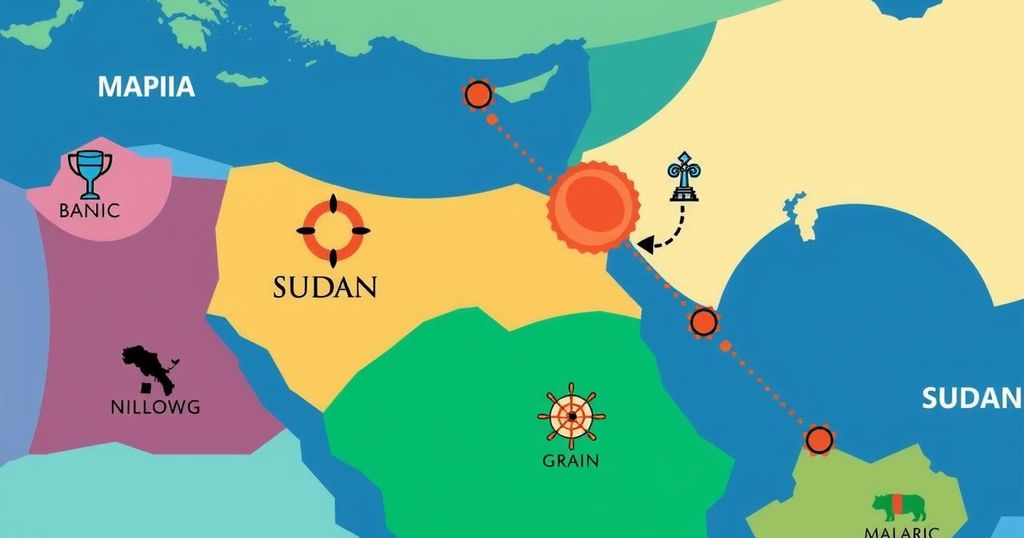The Sudanese civil war since April 2023 involves external actors such as Saudi Arabia and the UAE, who are purportedly providing support to rival factions. The involvement of these Gulf monarchies is influenced by historical ties and strategic interests in regional stability and economic opportunities. The ongoing conflict is viewed as resistant to resolution due to entrenched positions of the warring sides and external influences.
The civil war in Sudan, which erupted in April 2023, has drawn significant involvement from various external actors, particularly from Middle Eastern states. The primary factions in this conflict are the Sudanese Armed Forces and the paramilitary Rapid Support Forces, all fighting for influence over political and economic power. This ongoing conflict has given rise to one of the world’s gravest humanitarian crises, attracting support from foreign nations including Chad, Egypt, Iran, Libya, Qatar, Russia, Saudi Arabia, and the United Arab Emirates (UAE). Notably, although Saudi Arabia and the UAE have provided military and financial assistance to the warring factions, they have officially denied such actions.
The involvement of the UAE and Saudi Arabia in Sudan is influenced more by domestic dynamics than by a simple proxy war narrative. Important internal factors triggered the civil war, but the role of external states cannot be dismissed, especially given that Sudan has engaged extensively with Gulf monarchies over the last two decades. The relationship between Saudi Arabia and Sudan dates back to 1956, capitalizing on shared geographic proximity and cultural-religious ties to the Muslim holy cities of Mecca and Medina.
Conversely, the UAE’s involvement has evolved significantly since the early 2000s as it expanded its economic foothold in Africa, particularly in niche sectors like port logistics and infrastructure. By the late 2010s, both Saudi Arabia and the UAE strengthened their political influence in Sudan, especially during President Omar al-Bashir’s era, in an effort to counteract Iranian influence in the Red Sea region and Yemen. This relationship was cemented when Sudan contributed troops to the Saudi-led campaign against Houthi rebels in Yemen, enhancing ties between the Gulf states and Sudan.
Since al-Bashir’s ousting in 2019, Saudi Arabia and the UAE have sought to exploit the transitional period in Sudan to enhance their influence. They have supported opposing factions within the Sudanese military, where Saudi Arabia, alongside Egypt, has backed army leader Abdel Fattah al-Burhan, while the UAE has allied with the Rapid Support Forces’ commander, Mohamed Dagalo. This increasing divergence in their policies has emerged after years of strategic alignment, spurred by factors such as differing stances on political Islam.
Despite the tensions between the UAE and Saudi Arabia, the onset of the conflict was not a direct result of their rift. Local actors, cognizant of external support, felt emboldened to engage in warfare. Furthermore, the reluctance of both monarchies to withdraw support reflects their desire to maintain regional influence and avoid perceptions of weakness.
The significance of Sudan to Saudi Arabia and the UAE stems from two main factors: regional power dynamics and the strategic location of the Horn of Africa. The geopolitical shifts, particularly the US pivot towards Asia, have lead Gulf states to seek stronger ties with African countries to mitigate their own insecurities resulting from the Arab Spring and subsequent regime changes. Consequently, their military and political engagement with Sudan intensified between 2012 and 2020.
Sudan’s geographical position between the unstable Sahel and Red Sea regions offers both Gulf monarchies a critical connection to address pressing challenges such as poverty, food insecurity, and conflict. The country’s agricultural potential, underscored by its arable land and water resources, has also attracted substantial investments from the Gulf states, which collectively amount to between $1.5 billion and $2 billion, primarily in the agri-food sector.
As the conflict in Sudan continues, a resolution through dialogue appears increasingly unlikely. The all-or-nothing mindset of both factions further obstructs potential compromise. Moreover, the ongoing global shifts and the interdependence of external powers with the warring sides further complicate prospects for peaceful negotiations. As such, it is plausible that Sudan will witness a deepening divide in governance and power structures moving forward.
The civil war in Sudan has garnered significant attention from Middle Eastern nations, particularly Saudi Arabia and the UAE, whose involvement reflects historical ties and strategic interests. Both states aim to influence the political landscape in Sudan, driven by concerns over regional stability and economic opportunities. In the context of a challenging international environment and the absence of a clear resolution path, the conflict is likely to persist, deepening divisions within Sudan’s governance.
Original Source: www.inkl.com






